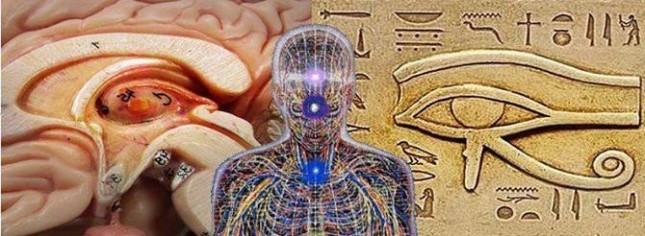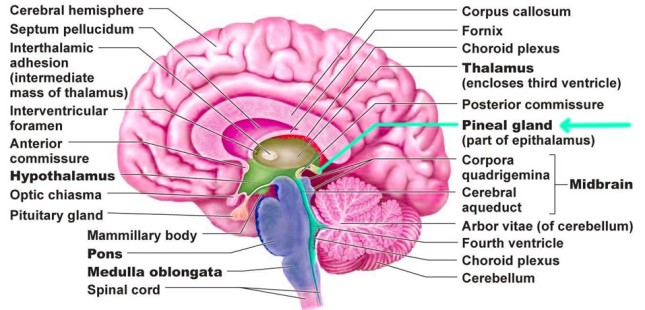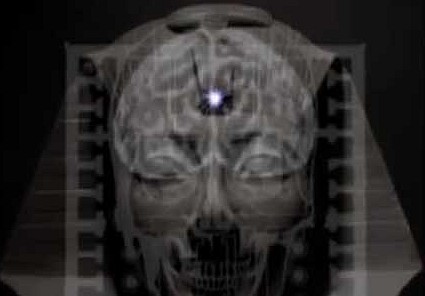We have already spent some time discussing the meaning of “Man” from a biological perspective. We determined that because of Man’s many unique abilities, traits, tendencies, and so on, Homo sapiens should not really be classified with “the primates” at all. Man is the same as absolutely no other creature, and we have made note of several uniquely human abilities that seem to indicate he should be a genera unto himself, rather than “the highest primate” representative.
The classification of humanity, or Man, or Mankind, or humankind, or whatever one chooses to call the collective set of beings (your choice, they are synonymous terms) cannot end at the level of genus, or even species. Part of any definition of Man must include at least an element of distinctive individuality – personality, if you will – that must be accounted for in any discussion of what Man is. Defining Man from a biological or physiological perspective, the purpose of our previous discussions, is also a little different than trying to determine what Man is from a purely psychological perspective, the goal of our present discussion.
Thought, Mind, and Self
To begin, it must be accepted that a thought cannot exist without a mind, and a mind cannot exist without a thought. Everything known is received through the screening and filtering provided by a combination of personality and reflection. Reflection, as a mental activity, could be the same, theoretically, in everyone, but the personality is something necessarily distinct and individual.
Most of what each individual can be or become, that is, the far bulk of what constitutes his potential, is determined by the very same things which regulate the fates of all living things. Environment, quality of upbringing, historical circumstances, influence and training, as well as parenting and DNA, play the major roles in determining what any particular living being can be. We are in this way largely products of culture, at once produced and informed by it.
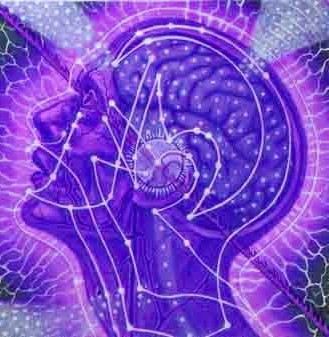 Beyond that, however, there are the not-so determined nor so obvious aspects of this or that particular individual. Unlike even the most intelligent animals Man has a penchant to seek improvement, to break barriers, to do things differently, and quickly, or out of season. Or, conversely, and unfortunately, Man has the ability and capacity to be lazy and regress, do damage, destroy things for no reason, and even harm his own kind, all at least apparently impossible for any other type of creature. Each human being, each individual – each “locus of centricity” as I like to say – and so each special [sic.] person has this potential to deviate from Nature.* This capacity to deviate, in any direction, is distinctive to our species, yet always expressed individually.
Beyond that, however, there are the not-so determined nor so obvious aspects of this or that particular individual. Unlike even the most intelligent animals Man has a penchant to seek improvement, to break barriers, to do things differently, and quickly, or out of season. Or, conversely, and unfortunately, Man has the ability and capacity to be lazy and regress, do damage, destroy things for no reason, and even harm his own kind, all at least apparently impossible for any other type of creature. Each human being, each individual – each “locus of centricity” as I like to say – and so each special [sic.] person has this potential to deviate from Nature.* This capacity to deviate, in any direction, is distinctive to our species, yet always expressed individually.
Every day humans break barriers mental and physical, do the seemingly impossible, set new records, and just strive to do better by virtue of some kind of compulsion to drive forward. Whether this constant human advancing be due to an innate unease or insatiability, or to a quest for production and improvement, or as some new theorists say with intricate mathematical formulae, whether it is due to God’s imagined and created world becoming fully realized, in any case we stumble here onto another aspect of the Human Gen(i)us.
This human genius, this unique creativity and expression of it, is quite individual, and so not so easily quantifiable. The ancients said correctly it is part of the form of Man, an essential quality. Yet this quality is never the same in any particular individual, that is, in this man or that woman. Everyone has the capacity but the expression of this capacity is individualized. Mimicry (aping, training, copying, following, etc.) is itself one form of this expression. A person could conceivably choose to live the life of someone else, as someone else, like someone else, this would not negate the capacity for nor the freedom of expression.
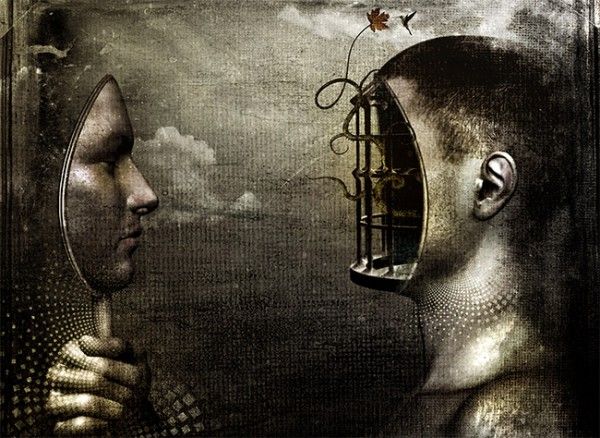
Finding the psychological origin of Man, then, is a different search than finding the biological origin of Man. We are looking for different things. While the source of the latter might be sought through studying genetic development, simple genealogy, or even Adam and Eve, the source of the former is more difficult to define, let alone recognize and pin down.
“Know Thyself” seems a very good definition of the type of experimentation necessary for such research. It explains well the introspective process, as well as the search to discover the central identity of the individual within. The oracle’s proclamation necessitates delving deep into one’s own mind in attempt to discover what stands behind and guides the perception.
Explaining, then, what one encounters in one’s own mind is a triply difficult enterprise, possibly what led Plato to opine that language can never express real Truth. Communication is limited by both the symbols of expression (language) and the effectiveness of the explication. I can relay my own personal psychology to you only through the limits of my personal expression, and it can only be understood within the bounds of your comprehension.
The psychological search for the origin of Man is an introspective one, and all I can hope for is that you the listener recognize aspects of this personal psychology, as I see it and as I am limited to writing about it, and somehow identify with it. Regardless, the search must at this point begin as a personal enterprise, an exercise in reflection that must consider not only the object of reflection, but also the reflector himself, or maybe it would be better to say, itself.
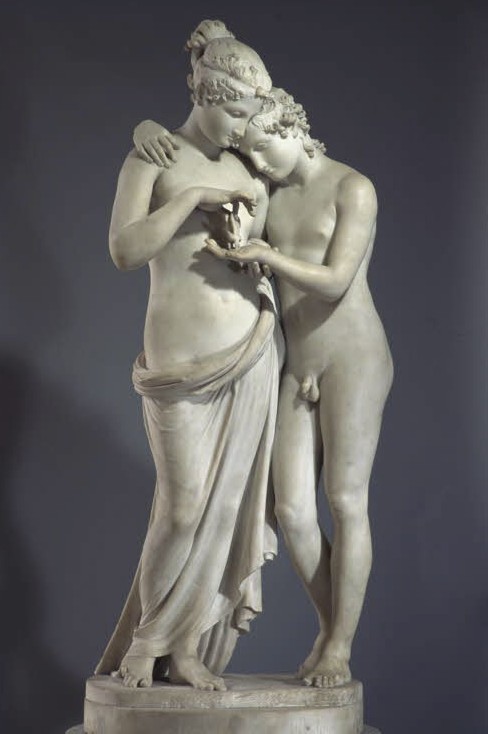
Psyche And Cupid; Louvre
Psyche, or The Soul
Once just a part of philosophy, the original psychology began because of the ancients’ acknowledgment of, and desire to learn about, a very real and quite significant part of Man, the human psyche. “Psyche” (Greek psuche) meant soul, basically, so originally psychology was the study of the soul. If this sounds old or antiquated to you, remember that this soul was considered something different from “mind”, for which the old Greeks used the word “nous“, and which is the object of today’s psychology . The mind, though, is but one aspect of the psyche, the latter something at once individual, yet in touch with eternity.
When Apuleius, in the 2nd Century AD, in Metamorphosis wrote about the love affair between Cupid and Psyche, he expressed in the myth this relationship between mind and soul. Two thousand years before Freud ever thought about separating the human mind into the id, ego, and superego, Apuleius by use of tradition and metaphor could be said to have accomplished the same (call this yet another note on “progress”…).
I want to discuss and elaborate a bit on this tale of Cupid and Psyche. First let’s understand what these words mean according to the myth, and so examine the players. “Psyche” in Latin, or psuche in Greek, means “breath of life” or “soul”, although some later have interpreted it also as “departed soul”. Cupid, the Anglicized version of the Latin cupido is a direct translation of the Greek eros, or desirous love. Some may remember that the Greeks had three words for love, the other two being agape (spiritual love) and philos (friendly love, or friendship/kinship). It should be remembered that Venus, the epitome of love and beauty who is the analog of the Greek Aphrodite, is distinct from, and more powerful than, Eros.
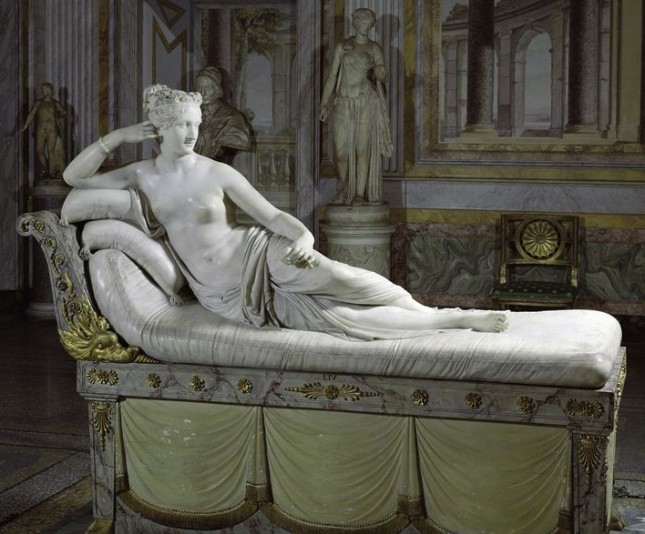
As the myth goes, Psyche herself was of such beauty that she “turned gods to daughters of men”. For this reason she draws the ire of Venus who, incensed with jealousy (How dare SHE be considered as beautiful as me, a goddess!), commences to making life miserable for Psyche, causing her by godly spells to be unwittingly attracted to the most hideous of men. But eventually the happy ending comes, or so it seems, and Psyche falls in true love, finds her “soul mate” if you will, when she comes upon the most beautiful creature she has ever seen, Eros, or Cupid.
What Apuleius is conveying through metaphor here is worth examining. Love and Beauty, a very powerful pair in the domain of the gods and philosophy alike, are personified as one by Venus. She is goddess and lord over all having to do with both Beauty and Love, and she is the desire behind all desires. She is angry and wants to punish the beautiful creation, soul or Psyche, because the attention of Man has become focused on it rather than on her. She is angry that Man does not see that it is really Beauty he is after. In punishment, the goddess makes the soul, the psyche, become attracted to all sorts of other middling prospects.
We notice that when Psyche beholds the concept of desirous love, Cupid, she must have it, and in fact, their union was destined to happen. This means that the soul, once it met desire, specifically erotic desire, it had to have it, and even for men today it is desire which motivates the soul to action. To achieve the object of its desires, though, the soul must endure trials and tribulations, and the greater, or more beauteous the desire, the more difficult it is to obtain, and the more trials and tribulations that must be endured. This is personified by Venus making Psyche run through many hoops in order to acquire or achieve union with desirous love, which can be interpreted as meaning that anything worth obtaining will not come easy. Eventually, Psyche does win Cupid, this signifying that the soul has finally succeeded in its desired union with the object of its greatest affection.
While Love/Beauty/Venus is angry because Men do not realize that what attracts their souls is attractive by virtue of Love itself, and that it is the Beauty in all things which attract Mankind, in the story Venus eventually allows the union. This means Beauty allows the soul to merge with desire, but only because the soul worked and struggled to acquire what it wanted. The desire must be real and strong for it to have the blessing of, or be permitted by, all-pervasive Love and Beauty.
The eventual marriage of Cupid and Psyche stands for the soul’s eternal union with desire. It expresses through metaphor the fact that from that moment on soul and desire will be as one, and a soul becomes synonymous with a desirous soul. Soul is now something which has desire as its main motivation, and today still, we want, we want, we want, thinking our object worthy enough to pursue by virtue of the beauty we see in it.
What we glean from this story, psychologically speaking, is that since ancient times Man has tried to explain his mental processes by sub-dividing it into different aspects. In this myth soul is portrayed as primordially separate, or at least distinct from Love and Beauty, which are again separate from desire. However, post-myth, after the marriage, a union was achieved, and while several aspects now make up the soul, it is a complete whole nonetheless.
In our minds, when we think, there is a reflector and a separate object of reflection. The idea thought about, real or imagined, is the object of reflection, and that which is observing the thought, or contemplating it, is the reflector. This myth seems to imply that the two – desire and soul – have become synonymous. In more than one way “the soul” and “a desirous soul” are the same, and it is only the object of desire, or the objectified thought, that can and does vary by individual and circumstance. The result is that Man is guided by desire, by want, and anything wanted must have some measure of Beauty within it, at least according to who desires it. What we really want is pure Beauty (or Love, or Good…), our efforts best termed pure desire, and all the other things we think we want are really just stand-ins for these pure forms. Individuals are motivated by and attracted to many different things, but always, indirectly, it is desire that is the effort and Beauty that is the object.
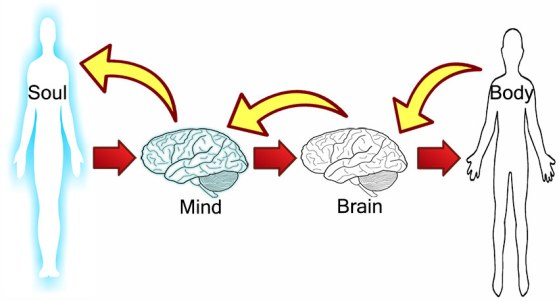
Nous, The Mind
A study of the mind is technically a biological study. Nearly every living creature, to the extent that it has a brain, or central nervous system that controls its behavior, can be said to have some type of mind. Plants bending toward the light, and similar autonomic reactions in the plant kingdom, may also be said to be indicative of a type of consciousness, and so of mind. A study of the soul, that is, the source of human personality, the spring of originality and creativity, the tone of the voice and expression, the energy motor, intelligence, will, and more, in contrast, can be informed by biology, but not answered by it.
Aristotle, as we mentioned, described several “types” of soul. Specifically (and I am drastically paraphrasing), he talked about a 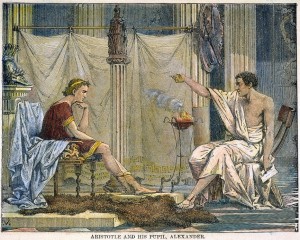 vegetative soul, an animal soul, and a human soul, and how each “higher” type of soul also contained within it the elements of the lower. Each type, correspondingly, has a certain type of mind. As an example, take three different types of living things – an elm tree, a lion, and a human. The elm tree grows by ingesting elements and turning them into energy by which it creates more cellulose and so it grows. The lion nourishes itself as well, but it can also move from place to place freely, can use mind to a higher degree, and if caught young could even be taught to perform and do tricks, and so taught to do work. It has enough mind to do basic tasks. The human eats and grows like the plant, reacting in response to environment and stimuli. The human also uses mind very well and, as Skinner, Watson and Pavlov (and Nintendo and the Army) have proven quite adequately, Man can indeed be trained to do tasks, sometimes whether he be aware of the training or not.
vegetative soul, an animal soul, and a human soul, and how each “higher” type of soul also contained within it the elements of the lower. Each type, correspondingly, has a certain type of mind. As an example, take three different types of living things – an elm tree, a lion, and a human. The elm tree grows by ingesting elements and turning them into energy by which it creates more cellulose and so it grows. The lion nourishes itself as well, but it can also move from place to place freely, can use mind to a higher degree, and if caught young could even be taught to perform and do tricks, and so taught to do work. It has enough mind to do basic tasks. The human eats and grows like the plant, reacting in response to environment and stimuli. The human also uses mind very well and, as Skinner, Watson and Pavlov (and Nintendo and the Army) have proven quite adequately, Man can indeed be trained to do tasks, sometimes whether he be aware of the training or not.
According to Aristotle, though, there is one aspect, a particular aspect of mind, which differentiates the soul of Man from that of any other creature. It is the nous poetikos, or the “poetic mind” that allows man to communicate using language, comprehend and compose music, create and invent, and overall, to just imagine. Poetic mind enables Man to have his fantasies, by which he has forged the technological and artistic “empire” you see today (we’ve yet to conclude what constitutes “progress,” after all…).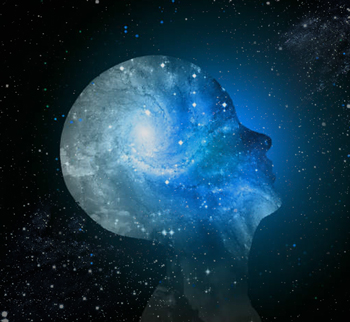
Nous poetikos’ counterpart, in Aristotle’s psychology,, was the nous pathetikos. While the former might be properly translated “poetic” mind, the latter can be translated as “passive” or “pathetic” mind. This common passive mind is held even by the animals, something indicated by the meanings of pathos from which it is derived, that is, signifying emotion-based, reactive, even conditioned behavior, rather than purposive, artistic acts, or rational thinking. While poetic mind makes us human and able to create, pathetic mind allows day-to-day living and is the gatherer of experience, the master of the senses. It is the individual plant, animal, or man plus the totality of that individual’s experiences.
We humans are each individually precisely a result of the combination of these two elements of mind. “Psyche” or “Soul” is these elements in a peculiar individualized combination, and it should be noted that for Aristotle this distinctive, calculative, poetic aspect of mind is divine, and unique to Mankind.
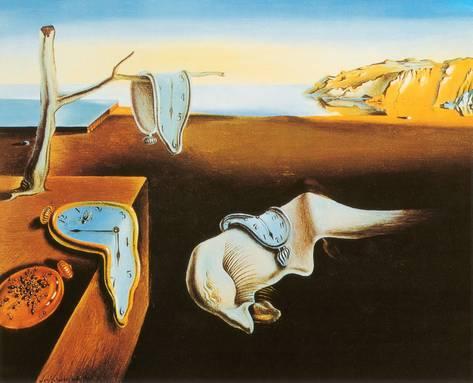
Aristotle’s teacher Plato’s anamnesis theory of knowledge stated that basically we are born already knowing everything there is to know, but that we have forgotten and need to be reminded. Probably this means we do not at first have the words, or an understanding of the concepts; we do not know what to look for in the storehouse of our collective mind. This “Persistence of Memory”, for Plato, is what makes any knowledge at all possible, analogized by the first time you did a complex (to you) mathematical equation and figured it out. This “eureka“. or knowing you got something right, argued Plato, relies on such a pre-existing knowledge. When the slave boy Meno is led to solve for himself a mathematical (geometrical) problem involving a triangle, this is meant to demonstrate that Meno already knew the answer, but just needed to be reminded.
Later in philosophical history this locus was seen as a place where body and soul meet. Rene Descartes would find the seat of the soul in the pineal gland of the brain, and he is interesting because of his introspection, or solipsism, which, as we have already noticed, involves thought processes similar to those we have been using. We have been examining thought, and consciousness itself, using consciousness itself.
Dualism And Monism
Now, I have never seen myself as a dualist but without a doubt I can see myself – as you can see yourself – in two main ways. There is, I know, an Angelo, a “me” that has never changed, at least as long as I have known it. I know “Angelo” is not (let’s say) him, but rather a name placed upon him. This me watches and sometimes suggests and endures, sometimes it scolds and sometimes it prods, but most of the time it just abides, succumbing to whatever experiences it undergoes. This “me”, this locus of my centricity, never really changes, never ages, and, indeed, there are times I think this me is not really me at all. But that it is there, “behind” my waking consciousness, I have no doubt.
In contrast, there is the physical Angelo, the one you see, the one who does things, the one who you speak to. He gets old, has changed his opinions and appearance over time, possibly he has lost a limb or organ and so part of his self. He is essentially a big box of assembled organic matter pretty much operationally and culturally conditioned, and stricken from birth with physical and mental limitations.
If I want to think of a memory, I will the image, think the thought, and the idea appears, and when that memory/idea appears it is of the same nature as my non-physical, overseeing self. If I attempt to think of Angelo, I think of an image of myself, like a photograph. It seems, though, that what is me is more what is doing the thinking than the image of myself I, or my mind, conjures up.
One can think of the phrase “But for the grace of God go I“. In this scenario just described, the one that takes place by the minute in my mind, this “me behind me”, the non-aging self, may be seen as this grace. Itself this grace cannot, in a sense, be touched by the material world. What it does is provide the mental capacity by which experience might be received. It is a giver but never a direct receiver. It is, as some have said, a “divine spark”, a connection if not downright partaking of goodness from beyond Earth.
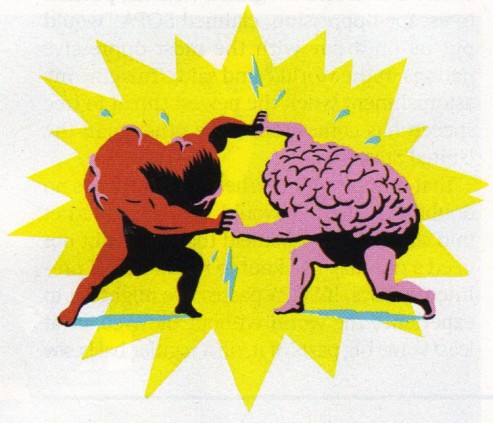
The dualism-monism philosophical battle has raged for centuries, but since, and largely because of Immanuel Kant, many “hybrid” theories have come upon the scene, claiming that we humans display both monist and dualistic tendencies. Kant realized that the old rationalist-empiricist philosophical debate about the origin or knowledge was going nowhere fast. Where his contemporaries argued about whether (the position of the empiricists) or not (the position of the rationalists) knowledge is received through experience, Kant showed both aspects to be necessary, and assuming of each other.
For newer psycho-biological theories, like those of Abrtaham Maslow, Julian Jaynes, and very recently Christopher Langan, many of these old debates are “solved” by changing the way we look at what Man is and what he can be. Schizophrenia aside, the minds of men are more complex and diverse than ever could have been imagined, and these new theories may therefore be correct in, if nothing else, their staunch insistence on the role of the observer in any such discussion. Consciousness is itself the condition behind all knowledge, and anything known must have to have been received through it, and formed by it.
I emphasize again that this is essentially the classic existentialist position (if one there be…), that Man is the measure of all things. What Man knows and can know about the world, or God, or even himself, must be filtered through human comprehension and explained in humanly comprehensible terms. It is the best we can do, and again, perhaps why it was seen by Plato as not good enough. For Plato it was enlightenment only, revelation, that brought real Truth.
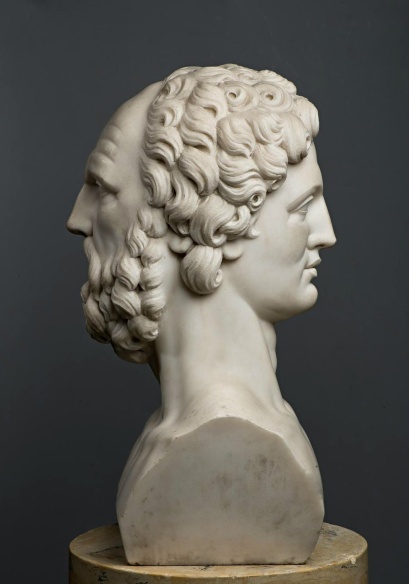
Conscious Man, Free Man
Now the question becomes, given this information, what is this Man, whose origin we have been seeking? Is it:
1. The sum total of all humanity
2. The origin of a particular group of humanity
3. The origin of one individual
4. The origin of an individual’s psyche
…or something else?
Properly, as we’ve said, Man should be a genus unto himself. This genus should be divided further into types, or species. Race or color is an obvious but probably incorrect way to make this division. We could instead try classifying us humans by such things as temperament (hot-cold-varied, Type A, Type B, etc.), blood type, intellectual level, and so on. These genera could even be further subdivided into species, and finally to no less than each and every individual being a separate subspecies.
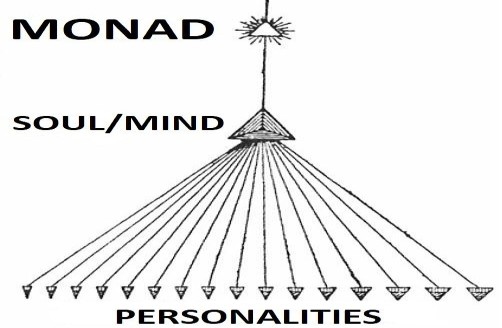
At the individual level, as some would say, at the level of the monad, and despite all their biological similarities, men are prone to drastic differences. What works for one might not work for another, and others are whole opposites and worlds apart, in temperament, in outlook, in motor, and personality. In a correct Chain of Being, the differences each human displays would be enough to claim that of all the general things which might be said of Homo sapiens, one of those must be that he has a definite individuality, one which makes the precise definition of what Man is therefore quite complicated.
For what, really, constitutes this individuality? Once again, there are the contenders. There is the waking self, the ego as it has been called, the human animal, which ages and must be trained and in sum is a smart relatively hairless monkey, and then there is the self behind the self, the psyche or soul, which sometimes informs, but mostly just provides the firmament for experience. Which is really me? Which origin are we seeking?
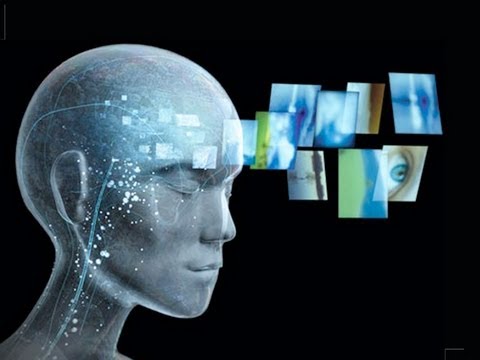
Clearly, I am at base a hybrid, but indeterminate in nature, a monistic complete whole with a unique dualistic aspect. Try this experiment. Next time you are in a quiet room with a clock ticking, make an effort to hear the clock. Don’t move your head. just direct your consciousness to the clock. Soon you will hear the clock a lot better. How is this, or what is this, that manipulates and directs the input of the senses? What is it doing the concentrating, or better to say, directing the consciousness? Is the director of consciousness the same as consciousness itself? In short, the question to ask here is which is you, the thing that directed the hearing, or the thing that did the hearing?Without doubt, both are necessary, but are they the same, or two parts of the same thing? We know that if we did not have the “super” consciousness behind us, without the “little voice inside our heads”, the self that never changes, Man would be nothing more than an animal, and perhaps less, with no actual center of being.
This distinction of Man also houses the conscience, which lets us know right from wrong. This is not to make an ethical judgment (either way), but just to call attention to how much depends on the unchanging aspects of each human being. Without waking consciousness we would have no need for a physical existence at all. The super–consciousness could receive no impressions and be unable to sustain any type of attention. What is clear is that the mind and soul need each other, just like Psyche needed Cupid. Therefore we must conclude that Man might (also) be defined, indeed, distinguished, by their cohabitation within him.
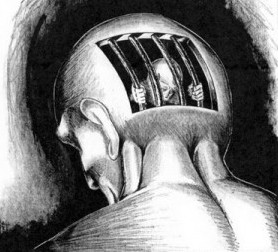 A spider can weave a brilliant, nearly perfectly symmetrical web, a cricket strum a perfectly timed tune, without ever taking a class or studying a lick. At least to our perception, the spider web appears as a brilliant display of constructed and created order, strong, suitable to purpose, and displaying intelligence in design. It is a marvel no less than the cocoon spun purposefully with art and utility by the common moth, to enable itself the metamorphosis into an entirely different being, while at the same time retaining its original identity. These creatures have themselves not only a metaphorical message, but a grace, and perhaps it is a grace we humans, too, once had. Perhaps at one time we knew what to do from birth, we had to take no lessons nor study nor work to live and thrive and create. Perhaps it was a paradise on Earth. Perhaps we were born like the spider and had inherent to our natures special and specific duties, and so were also graced by knowing inborn how to act and what to do. Perhaps having this predicament, we grew bored, we grew free, and we grew independent.
A spider can weave a brilliant, nearly perfectly symmetrical web, a cricket strum a perfectly timed tune, without ever taking a class or studying a lick. At least to our perception, the spider web appears as a brilliant display of constructed and created order, strong, suitable to purpose, and displaying intelligence in design. It is a marvel no less than the cocoon spun purposefully with art and utility by the common moth, to enable itself the metamorphosis into an entirely different being, while at the same time retaining its original identity. These creatures have themselves not only a metaphorical message, but a grace, and perhaps it is a grace we humans, too, once had. Perhaps at one time we knew what to do from birth, we had to take no lessons nor study nor work to live and thrive and create. Perhaps it was a paradise on Earth. Perhaps we were born like the spider and had inherent to our natures special and specific duties, and so were also graced by knowing inborn how to act and what to do. Perhaps having this predicament, we grew bored, we grew free, and we grew independent.
Many myths and theories and tales of possibility exist about how Man came to be in his current predicament, theories from fallen angels to extraterrestrial insemination flood the bookshelves and internet. Maybe we humans once did curse the bound slavery of determinism, it is possible we did rebel against our pre-programmed animalistic fates and destinies, and demanded of our Creator the freedom and liberty to think, live, and act as we so see fit. On the other hand, maybe we have always been free, created that way, and it just took us a while to realize what we ourselves could do.
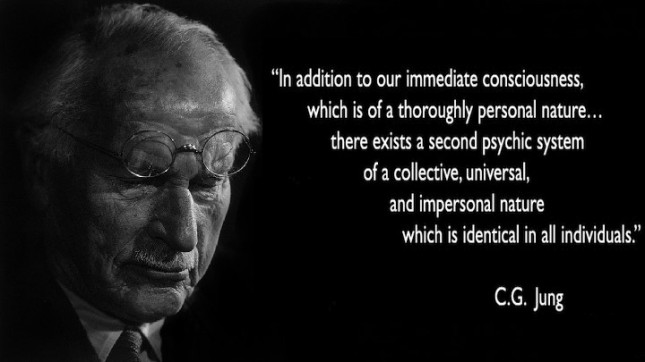
When theorists such as Julian Jaynes observe that in the process of Man’s evolution – or through his advancement forward in time – Man “became conscious”, they imagine a time when Man was like the spider and the rest of the “unfree” or determined creatures we have been discussing. If this is true we can entertain two possibilities. There is a first possibility, one which must presume that Man was, before that time, unconscious, or without consciousness of an outside world, and there is a second possibility, presuming that Man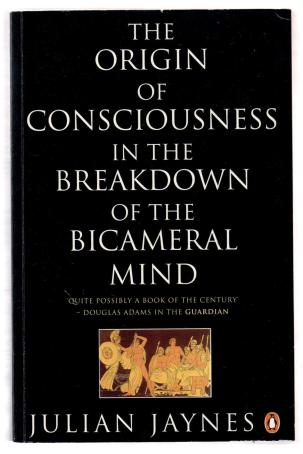 gradually achieved a functioning elementary level of consciousness, by which he could, to use Jaynes’ example, separate the waking world from the dream world.
gradually achieved a functioning elementary level of consciousness, by which he could, to use Jaynes’ example, separate the waking world from the dream world.
This is evolutionary thinking applied to the human mind, and like many in Science Jaynes believes Man had to learn, or come to evolve enough, to distinguish the things of the outer 3D world from those of his inner world; he thinks there was a time when primitive Man’s made no distinctions, or rather could not yet understand the distinctions between sense perceptions, thoughts, and dreams.
Was Man originally born free, or rather, did he gradually become free? This is the real question. The answer depends on what you mean by free. Consider just two possibilities, the first “freedom” in the natural-born sense, and then”freedom” as in freeing yourself from something.
Certainly the darkness, the thunder and the lightning, the weather and the rivals and the wild beasts, the stinging and biting insects, the hungers, and the other threats to his daily life cause apprehensions in the minds of primitive and modern Men alike. These apprehensions often develop into something like fears, and when these “things to be shunned” become persistent and prevalent enough they can affect behavior, acting spontaneously and freely being one such behavior. Because of these forces Man comes to think he is not free, and so, in a sense, these forces control him, thus limiting his freedom. Born free, it seems to me the only limits known to Man are those he places on himself. Accepting laws of society is one thing, being afraid of the bogey man, or letting fear of squid keep you from trying calamari, are different things entirely. In the natural-born sense, our first possibility, and despite his superstitions, we can answer “Yes”, Man is born free.
Similarly, and as for the alleged “birth” of his consciousness, it must be assumed that as long as Man has been Man, with at least enough awareness to know himself, and so his own existence, he can be said to always have had consciousness. When it comes to whether Man is free in the sense of “free from something”, our second possibility, recognize this assumes Man is somehow limited. This assumption, often expressed as Man being burdened, restrained, or somehow limited from birth, can be considered a bad assumption, a false assumption. Physical limitations, peculiarities of environment, bad genetics, none of it, in my opinion, negate Man’s freedom. Inability to accomplish a goal, or achieve a desire, many blame on these supposed limitations or “extenuating circumstances” (if God made me just smarter/bigger/stronger/richer I’d have been a pro ball player/doctor/president/playboy yadeeyadeeyada…), when really it is just their own physical and mental capacities that are the real culprits. In this way too, Man is free.

Conclusion
They say be careful what you wish for, and it appears what has happened is Man has gotten his wish. Man is allowed the one glorious privilege of freedom, ultimate freedom, a liberty limited only by environment and purposeful restraint. This poetic mind, the super-consciousness, this soul or spirit, is a main artery connected with God, truthfully an image, a reflection, of the Creator. The main religions of the world say God created Man in His image, as in the Bible’s Genesis 1:2 “…male and female created he them”.
While most often such passages are interpreted to mean “in His likeness”, meaning looking like God, or acting like God, or thinking like God, consider a moment another possibility. When one looks in the mirror, or on the surface of water, there is a reflection, and what one sees in this reflection is an image. Now what is God’s reflection? What is God’s thinking of, and what does it concern? When God looks in the mirror, what image does He see?
Whatever you think the answer is, suppose Man was created IN that. God creating Man in his image could literally mean God created Man in his reflection, in his mind. Given such a presumption, and when we continue to discuss the origin of Man, we must then conclude that the Man for whose origin we search is a mental construct – a concept, an idea. It is quite literally a conceptual designation, deep down an exclusive, particular expression of divine enthusiasm.
*n.b.: It’s almost a shame I can’t just use the word soul to describe the individual, as this word explains well the purposive and literally extra-terrestrial aspects of an otherwise common Earthly biological organism. The problem is today soul connotes religion, and while probably this is understandable, one must realize that “religion” itself, as a concept as well as practice, is itself a product of the imaginings and workings of this very soul.
